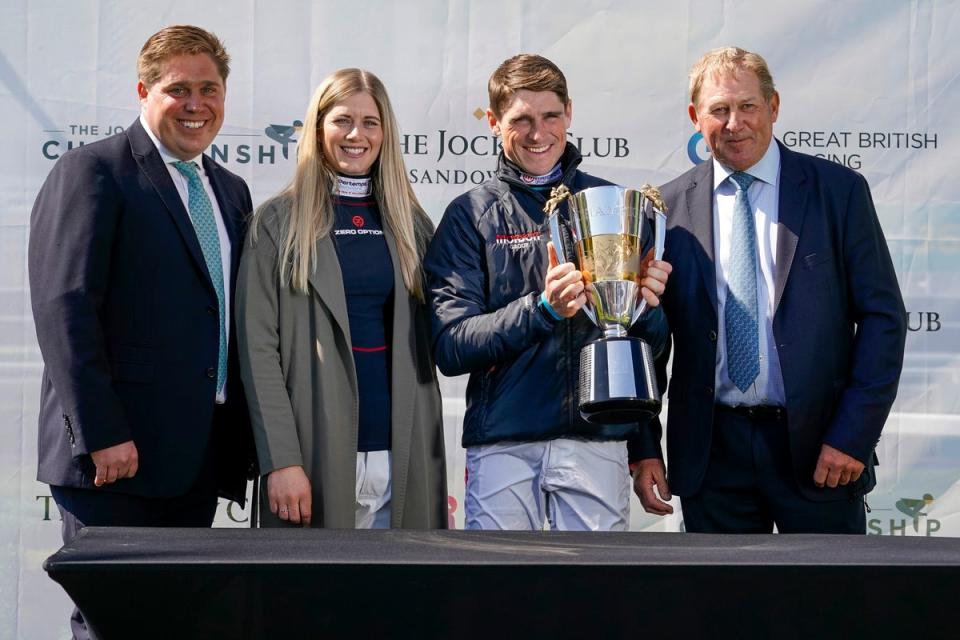Skelton brothers interview: How dad's recovery inspired success ahead of Cheltenham Festival return
When the showjumper Nick Skelton suffered in a fall in 2000, his then teenage son Dan’s first reaction was to run to the spooked horse, rather than his stricken father.
“Working with horses, they sometimes bite you, kick you or you fall off,” says the trainer. “The vast majority of the time, the person that gets bitten, kicked or falls off jumps back up. Dad didn’t.”
Skelton Sr’s neck was broken and he was told he would never ride again. Dan’s brother, Harry, nearly four years his junior, never doubted his father would get back in the saddle, though, and remembers bouncing up and down on his hospital bed when he visited him.
“It never occurred to me how bad it was,” recalls the former champion jockey. “He’s your dad, he’s invincible, he’ll be fine.” Skelton Sr sought far and wide to find a doctor who would finally allow him to get back in the saddle, although he fell off his first time riding properly, before going on to win Olympic gold in 2016; at 58, Britain’s oldest Olympic champion for 104 years.
“He always tells us it’s not what you achieve in a day, a month or a year,” continues Harry. “It’s what you achieve in a lifetime.”
The boys’ father has passed on a drive that both share in their differing roles in the riding world, as well as an obsession for winning. “It’s like a drug,” says Harry. “You just want more.”
Not even partnering for 1,000 winners — a milestone the pair passed in October — is sufficient, nor Harry’s champion jockey title in 2021, nor the stable’s two winners at last year’s Cheltenham Festival.

The pair are sitting in an office above stables at Lodge Hill, in the heart of the Warwickshire countryside, just days out from having another crack at the Festival.
Dan is second in the trainer standings, just shy of £2million prize money for the season behind Paul Nicholls, under whose tutelage he spent his formative years.
Bar two years at the start of Dan’s early training days, the siblings have been inseparable and seemingly destined for their respective roles. There is even a picture of them in which Harry is just two years old, dressed as a jockey, and his big brother as a trainer.
As kids, they would occasionally fight, but never now. “You come to loggerheads if you think differently,” says Dan. “There’s not much we think differently on.”
They had the ideal learning curve, not just from an equine father, but Dan from Nicholls and Harry from the likes of legendary jockeys Ruby Walsh and AP McCoy. As Dan puts it: “I opened my ears more than my mouth.”
For both, a Festival winner is the ultimate. “It’s basically our Olympics,” says Harry. “When you have a Festival winner, it gives you a feeling that no other meeting can — there’s a golden lining to it.”
The ultimate target is to end the Irish hegemony at the Festival. What hope of the Brits finally doing so over the next four days of racing?
“This year, no chance,” says Dan. “They’re in front of us and we’ve got to try and get it back somehow.
“Sport is cyclical and it’ll come round, maybe not full circle but there’s no point waiting for it to happen. You’ve got to work hard at it. If we all work hard, don’t be afraid of change — even dramatic change — it might work. But this year? No chance.”
The brothers have no shortage of contenders from their yard this week but, if successful, there will be only the briefest of celebrations. “When we hit a thousand winners, it’s not like we said, ‘A thousand winners, thank you very much’,” says Harry. “It’s on to the next thousand. You win, tick, done, next, just like dad did.”
Dan shares that same drive to keep winning, but uses the example of jockey Graham Lee, who suffered life-changing injuries in a fall last year, to give him a sense of perspective.
“Graham said he never considered what he did in the sport amounted to much — and he’s the only jockey to win both the Grand National and Gold Cup at Ascot,” he says.
“That quote sums up this sport, as you’re so caught up in it you don’t appreciate what you’re achieving in it.
“Only when you get to the end do you look back and think it’s worth something — and we’re a long way off from that.”

 Yahoo News
Yahoo News 
